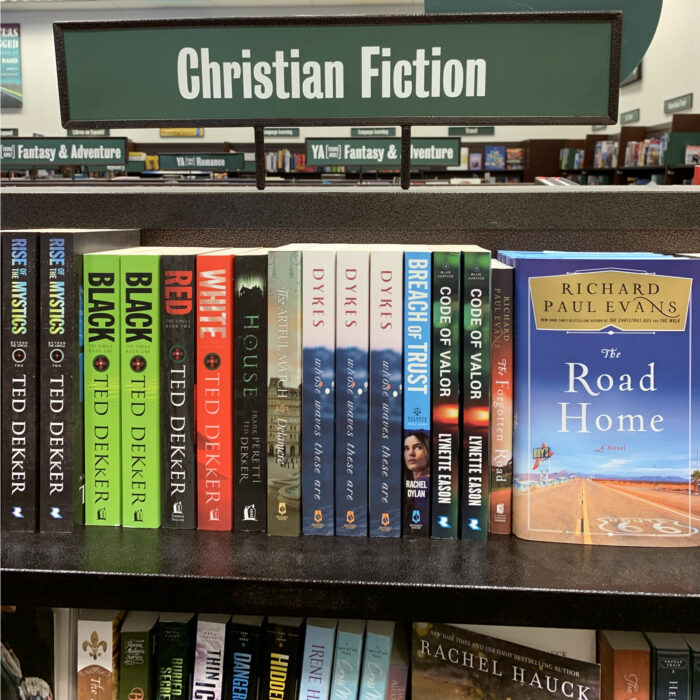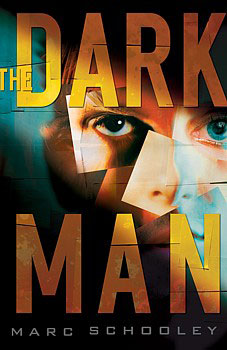‘The Dark Man’ Lurks In Dreams
Even though I’ve read through this novel twice now, and digested it as well as I could, I still find it difficult to know what to make of The Dark Man as a whole. I could focus on only one aspect on the novel and criticize it negatively or neutrally, depending on what aspect I was looking at. But that would be unfair, because this novel has affected my thinking greatly since I first read it, giving me a new metaphor to examine my own life. It is a powerful story, though not so much in the emotional sense that people usually mean when they call a work of fiction “powerful.”
 Part of my difficulty with interpreting The Dark Man is that I’m unfamiliar with its genre. I wish that I had read some of Stephen King’s novels, as well as the fundamental Christian speculative and spiritual warfare works by Frank Peretti and Ted Dekker. Since I haven’t read any of those, my suspicion that The Dark Man may have certain similarities to the styles and techniques in those works is, of course, nothing but a suspicion.
Part of my difficulty with interpreting The Dark Man is that I’m unfamiliar with its genre. I wish that I had read some of Stephen King’s novels, as well as the fundamental Christian speculative and spiritual warfare works by Frank Peretti and Ted Dekker. Since I haven’t read any of those, my suspicion that The Dark Man may have certain similarities to the styles and techniques in those works is, of course, nothing but a suspicion.
I have been calling The Dark Man paranormal, and I know that is has been compared to The Twilight Zone (some of the episodes of which I have seen). The difficulty in comparing The Dark Man to The Twilight Zone is that in The Dark Man, the paranormal elements have very little impact upon reality. There are a lot of bizarre visions, as well as the anomalous character of the “dark man” for which the book is named. The visions have meaning in regard to the plot, but they never accomplish anything external, as far as I can tell. Any possibility that the visions may be directly spiritual seems to be refuted by the story, where an important character says that the dark man cannot be a demon. Therefore, The Dark Man is not primarily a spiritual warfare novel. In fact, it is not even extremely speculative, although it has a sense of unexplainable mystery that justifies its claim to be speculative.
Most, but not all, of the content of the visions in the story could be explained as psychological phenomena. However, it’s not accurate to say that they are only psychological. Nearly every major character in the novel is shown to have some sort of internal psychological dialog at one time or another. Surely they all can’t merely be hallucinating! Furthermore, they share common elements in their visions. The dark man is primarily a part of Charles and is the main subject of many of his visions, but other characters also see the dark man, even if they don’t know what it is.
My theory is that these visions and internal conversations are abstractions or personifications. The characters all think they are just crazy, or are simply just dreaming. The internal conversations of the protagonist and of one other character may be related to the characters’ psychological states. Early in the novel, a vision seems to be a real supernatural entity during an intense spiritual battle. Even for these rare instances where the visions may have a slight bearing on reality, I believe that the visions only represent the psychological and spiritual drama, depicting the characters’ spiritual struggles and psychological confusion. That the characters see and interact with these visions is the mysterious paranormal element of the story, defy explanation.
Although the visions in The Dark Man are probably far more complicated than simple allegory, they feel somewhat like Medieval dream-vision literature, with abstract representations of virtues and vices. In The Dark Man, there is no specific scheme of allegory to explain the abstractions; I think there may be symbolism.
However, the character of the dark man itself is somewhat like the personified characterizations in works like The Summoning of Everyman and The Pilgrim’s Progress. I don’t understand all that the dark man is, but the dialog states one thing that he definitely is. To the extent that the character who tells us this is reliable, the dark man is the flesh, the corrupt human drive toward selfishness and sin. In the medieval dream-vision literature, the dark man’s name would have been Flesh. Here, the personification is much more complicated, but it does have that same sense of direct analogy as well, which is really the only identifiable symbol in the whole book.
Of course, the comparison of The Dark Man to dream-vision literature is limited, because The Dark Man has a literal story as well as abstract symbolism.
There’s a whole lot more to The Dark Man than the bizarre visions. Partly because it’s only slightly speculative, it could probably fit into many other categories of fiction. It is appealing to people who like the paranormal feel of The Twilight Zone and those who are interested in literary symbolism, but it is also an action thriller with espionage. The action sequences never really cross the line to unbelievable, and yet they are often intense. The action and spy scenes are enhanced by interesting technological gadgets that give the novel the right to be classified as near-future cyberpunk. The story also contains romance.
The most inconsistent element of The Dark Man may be the writing style. Sometimes, the writing drew me in and engaged me, as in the elaborate, precise description in the first part of the first chapter. That descriptive prose suggests classical mythology, setting me in the mood to appreciate the epic conflict that lies above and parallel to the literal conflict in the form of the visions. However, at other times the writing struggles awkwardly, such as in some of the action sequences. The writing is terse and often uses conversational phrases, which are sometimes unclear and vague. For instance, how am I supposed to imagine a “that oughta do it” gesture? Several times, the prose immediately after a line of dialog or of internal thought will play off of what was said or thought. Too often, a single sentence is set off in its own paragraph for profound emphasis, which is a fair enough technique, but in many cases the emphasis seems unnecessary and awkward.
A strength of this novel is its cast of characters. The reader comes to know several of them very intimately through their abstract visions. The character of Cleveland is particularly well portrayed and entertaining. The protagonist, Charles, is intentionally not as distinctive. His role is that of an Everyman figure with whom the reader can sympathize and identify in his quest for identity. In his relationship to the main supporting character, Charles may also be a Christ figure. The main antagonist is another deeply portrayed and quirky character, and if his arrogance and avarice are a little cliché for the standard story villain, the character is believable. The important characters are dynamic, not only in the sense that the characters develop and change as a result of the conflict, but also in that the reader’s perception changes.
In the ebook edition that I read, external formatting is sometimes problematic enough to cause distraction while reading. The thing that annoys me the most is the inconsistent use of italics. I wish all the characters’ specific thoughts were always italicized. As it is, characters’ thoughts are in normal roman text without quote marks, sometimes making it difficult to see specifically what sentences are internal dialog, which is a huge part of the narrative in this novel. There are some places were italics are used, apparently at random. In one place, a line of dialog within a vision is both quoted and italicized, perhaps for extra emphasis. I hope the formatting of the print edition is to higher standard.
That complaint aside, The Dark Man by Marc Schooley is intriguing and memorable. It may not be an extremely refined and polished read, but it is profound and sincere, as well as exciting. It has the ability to help us view our selfish inclination in a way that can prevent us from being discouraged by it while not giving in to it.
(Originally published at Amazon.com.)


































